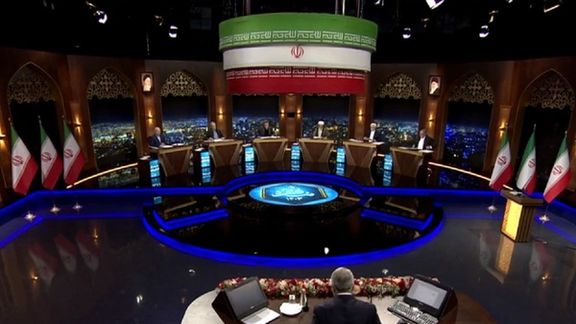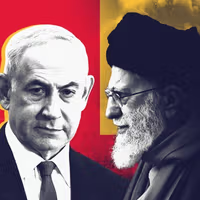The state-led internet shutdowns amid the violent crackdown on the November 2019 protests became a heated topic of discussion between conservative Amir-Hossein Ghazizadeh Hashemi and so-called reformist Masoud Pezeshkian.
Known as Bloody November, the protests were initially triggered by an increase in fuel prices but quickly evolved into calls for the overthrow of the state and Supreme Leader Ali Khamenei.
It has been noted as one of the most significant civil uprisings since the Islamic Revolution in 1979. Reuters reported that at least 1,500 protesters were killed in the state's crackdown on dissent, while other reports have suggested that at least 3,000 were killed, with tens of thousands detained.
In the fifth presidential election debate on Tuesday, hardliner Ghazizadeh Hashemi claimed that a deputy head of Masoud Pezeshkian’s campaign was the “commander of the internet shutdown operation” during the November 2019 protests.
Ghazizadeh Hashemi was referring to Mohammad-Javad Azari-Jahromi, who served as the Minister of Communications in Hassan Rouhani's government during the three-day internet blackout.
He labeled Jahromi as the "main agent of filtering" and the "commander of the internet shutdown" stating, "The largest slaughter of the internet is recorded in the name of Rouhani's administration."
Azari-Jahromi responded to the allegations which were echoed in previous debates, in a tweet, stating: “Mr. Ghazizadeh, the order to cut off the internet in 2019 was approved by the candidate who was sitting next to you in the debate. Why are you misrepresenting the facts?”
Jahromi was referring to Saeed Jalili, one of the ultra-conservative candidates in this presidential election.
In response to Ghazizadeh’s attacks, Pezeshkian mentioned that in a phone call, Jahromi emphasized that during his tenure as minister, Saeed Jalili and Mohammad Bagher Ghalibaf were part of the Supreme National Security Council (SNSC) and the order to cut the internet came from there.
Pezeshkian added that Jahromi was taken to court for attempting to resist the decision to cut off the internet in November 2019.
After the debate, Jahromi corrected Pezeshkian in a tweet, stating that Ghalibaf was not a member of the SNSC at that time.
The overall issue of internet filtering and shutdowns was also discussed by other candidates in the debate.
In addition to internet shutdowns, Iran's fixed broadband internet speed for the general public is among the slowest in the world, ranking 156th out of 181 countries according to the Speedtest Global Index.
Alireza Zakani, another conservative hopeful, mentioned "protecting freedom, security, and privacy" of citizens alongside creating opportunities for "internet access and employment" as goals of his administration.
Jalili supported domestic messaging apps and the national internet, which restricts access to foreign websites.
Pezeshkian also defended the government's "intervention" in people's internet access and cutting it off during times of crisis in the country.
Under the leadership of Isa Zarepour, Minister of Communications in Raisi's administration, internet accessibility has not only stagnated but has also become more restricted.
The government has intensified its censorship efforts, routinely blocking access to popular platforms such as WhatsApp and Instagram, and deliberately disrupting service.










